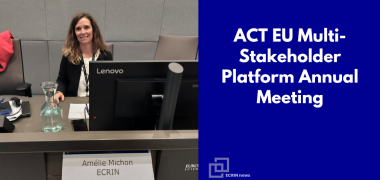ECRIN Celebrates International Clinical Trials Day 2016
The meeting aims to increase awareness of ECRIN and its Czech national scientific partner – the Czech Clinical Research Infrastructure Network (CZECRIN) – and to address issues related to personalised medicine and multinational clinical trials.
The event will bring together around 150 researchers, policymakers and other stakeholders from the Czech Republic, elsewhere in Europe and internationally. Presentations and roundtables will address the meaning of personalised medicine; the development of personalised medicine within child oncology; patient, scientific, regulatory and industry perspectives; methodological, ethical and regulatory challenges; and the future of clinical trials and evidence-based medicine in the era of personalised medicine.
Held under the auspices of Milan Štěch, the President of the Senate of the Parliament of the Czech Republic, the event is organised by ECRIN and CZECRIN in cooperation with the Czech Committee on Health and Social Policy.
About International Clinical Trials Day (ICTD): May 20th
ICTD was launched in 2005 to celebrate the day when Scottish naval surgeon James Lind started his famous clinical trial on scurvy in 1747, and laid the foundation for modern clinical research.
While serving as a surgeon on the HMS Salisbury (a ship of the British Royal Navy), Lind carried out experiments on 12 sailors suffering from scurvy. The men, grouped into pairs, were given a variety of dietary supplements (e.g., cider, vinegar, seawater, garlic, mustard, oranges and lemons) over six days. Those who consumed citrus fruits noticeably improved, providing evidence of the superiority of this treatment over others (two centuries before the discovery of vitamin C, the active substance).
Clinical trials have come a long way since Lind's discovery. Each year, ICTD, celebrated on or around 20 May, provides the opportunity to acknowledge his work and the major improvements in health outcomes that have resulted from clinical research. Learn more: www.jameslindlibrary.org/articles/james-lind-and-scurvy-1747-to-1795/
Multi-Country Trials: Importance and Challenges
Clinical trials are an essential step in evaluating the efficacy and safety of innovative treatments, exploring new indications for authorised drugs, and comparing the efficacy and safety of approved healthcare strategies.
International collaboration is important for clinical research, as it maximises access to patients and leads to faster results. It also enables the sharing of medical and scientific expertise, tools, procedures and costs; increases the applicability of research findings; reduces duplication; and enhances methodological standards. The evidence from multinational trials can support enhanced health policy-making, optimal resource use, and improved patient care across borders.
Despite these advantages, just 3% of academic trials and 30% of industry trials are multinational. In Europe, the relative scarcity of academic trials in particular can be explained, in part, by limited public funding and restrictions with current cross-border funding options. Other general barriers to multi-country collaboration include divergent legal, regulatory and ethical requirements; difficulties in locating clinical trial units; and linguistic, managerial and administrative issues.
Due to these obstacles, investigators may forgo multinational trials in favour of trials conducted in a single centre, or in multiple centres within one country. This limits the scope of research and reduces its potential impact on global public health.
ECRIN, Linking Groups across Borders
Since its creation in 2004, ECRIN has been striving to overcome the challenges to multinational trials in Europe. ECRIN focuses on independent, academic research as well as trials initiated by biotech and medical device small and medium enterprises (SMEs). It provides support to sponsors in investigator-initiated trials and helps them navigate Europe’s fragmented health and legal systems.
ECRIN’s organisational model is based on country membership. To date, it has seven full Member Countries (France, Germany, Hungary, Italy, Norway, Portugal and Spain) and two Observer Countries (Czech Republic and Switzerland), with other countries about to join. Each country has a European Correspondent, who manages the trial portfolio and coordinates with the national scientific partner (i.e., network of clinical trial units, CTUs) with support from the Paris-based Core Team.
Types of ECRIN Support
ECRIN provides support for the preparation of multinational clinical trials (e.g., trial logistics, funding applications), the validation of study protocols (scientific and logistical review), and trial management (diverse services). In support of these activities, it develops and maintains freely accessible tools such as databases on regulatory and ethical issues, outcome measures, and risk mitigation.
ECRIN currently provides consultancy and management services to more than 30 trials, with an average of seven countries per trial. To receive support, trials must involve at least two Member or Observer Countries and meet scientific and logistical criteria for excellence and quality (assessed by ECRIN’s Scientific Board and European Correspondents, respectively).
In addition, ECRIN contributes to collaborative projects aiming, for example, to establish shared trial services, further develop infrastructure, and foster international cooperation in non-commercial trials. ECRIN-supported trials benefit from these projects, as they are able to use the tools and findings that they produce.
ICTD: Supporting ECRIN’s Vision of Evidence-Based Medical Practice
ECRIN hosts a meeting in honour of ICTD every year, engaging European and international stakeholders in discussion on various clinical trial topics. Through this activity, ECRIN hopes to support its goal of promoting dialogue and multinational collaboration on clinical trials and, in turn, making progress towards its vision: a world where all medical practice is based on scientific evidence.





